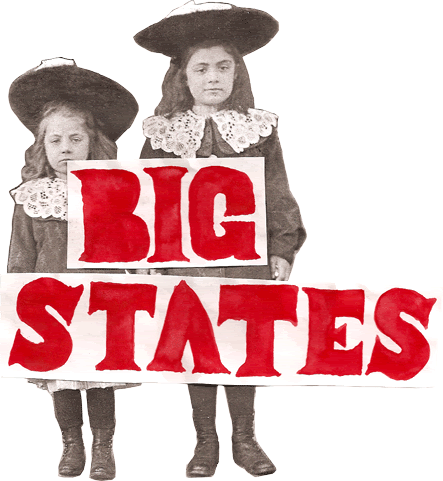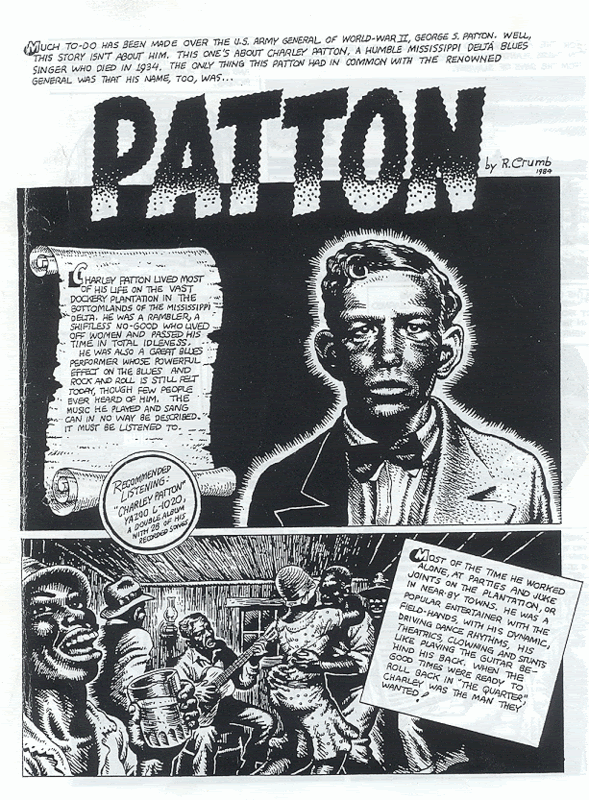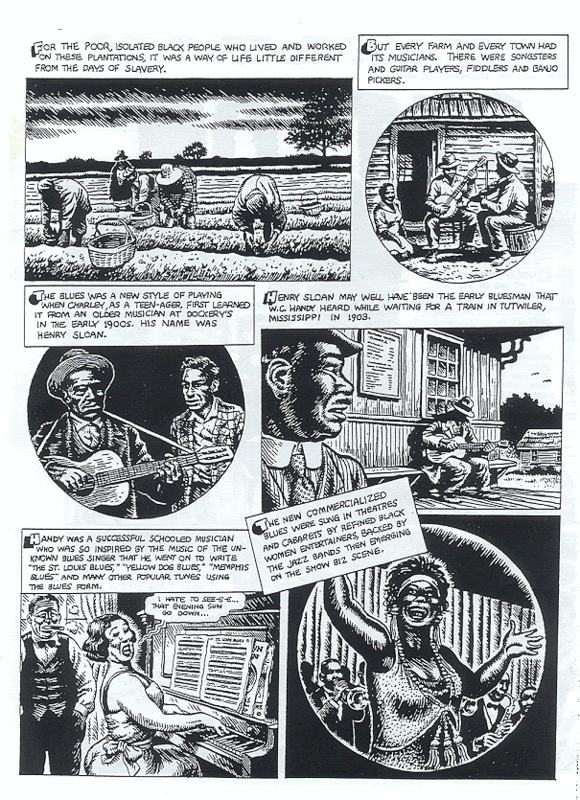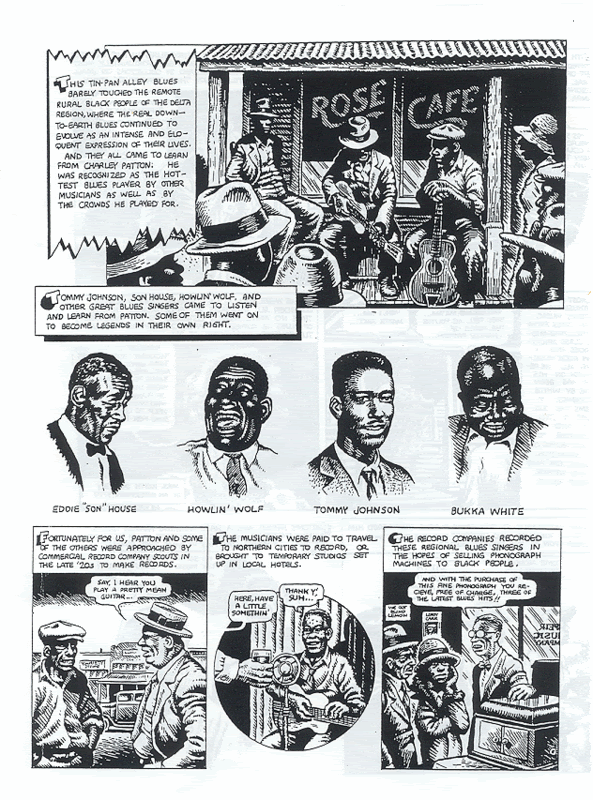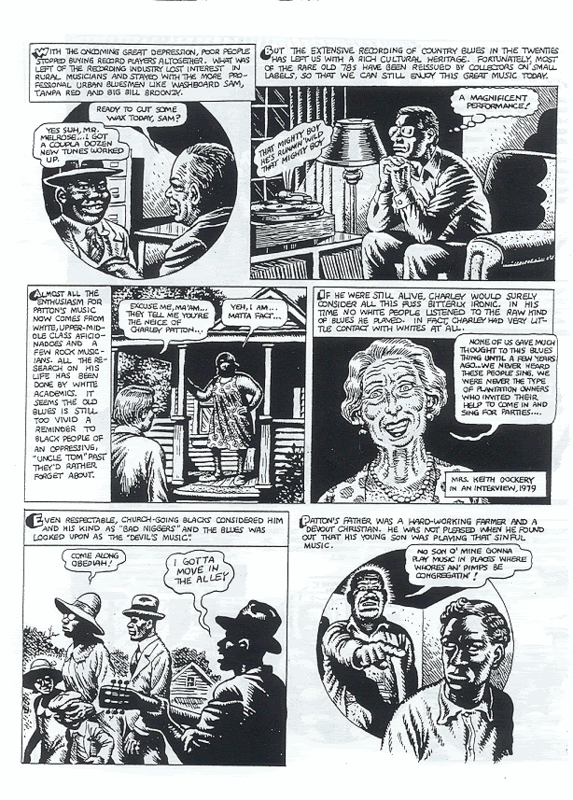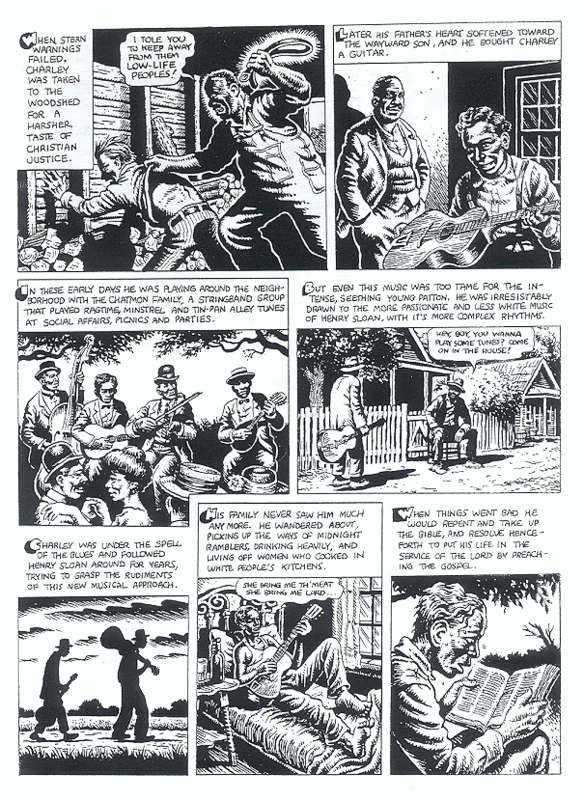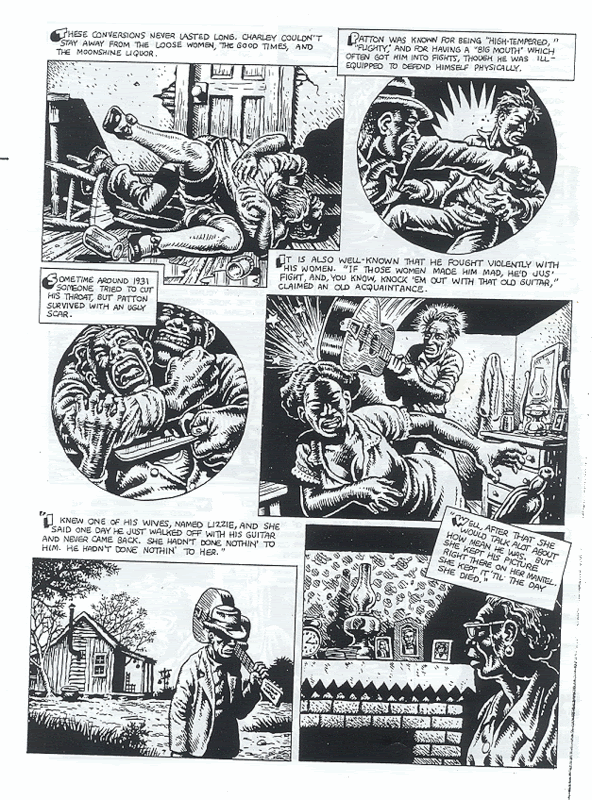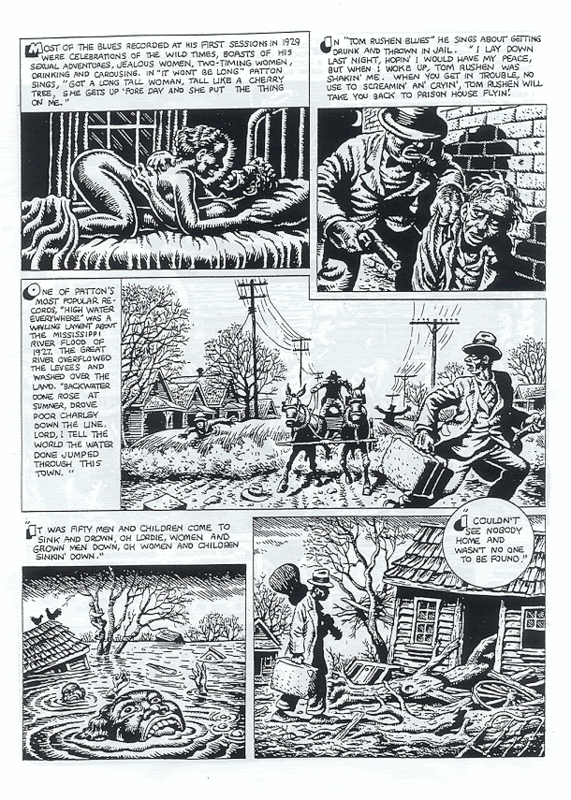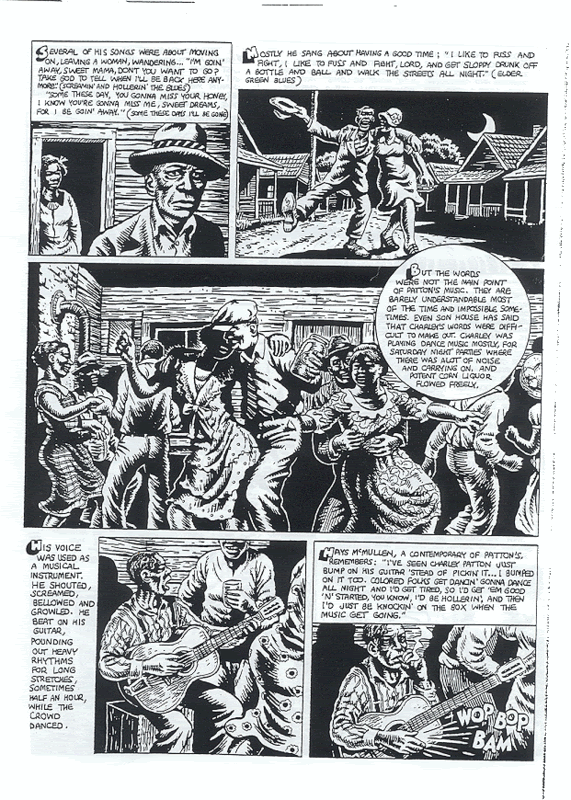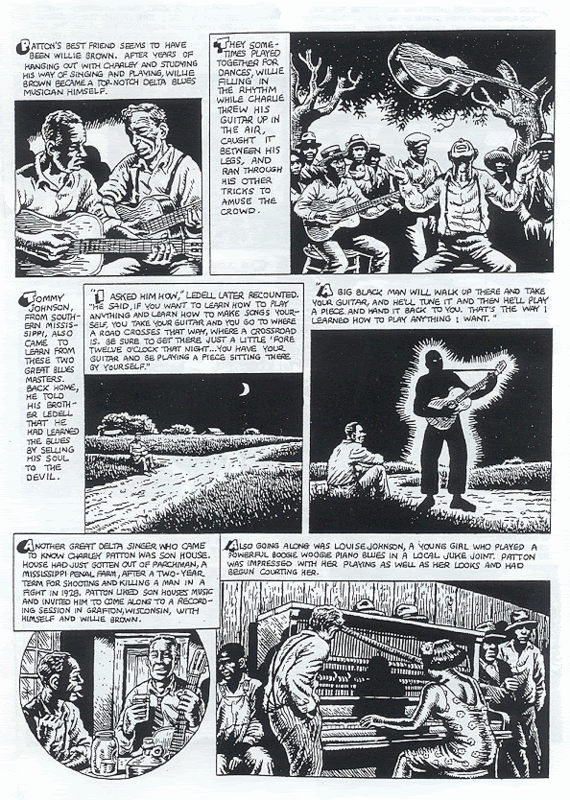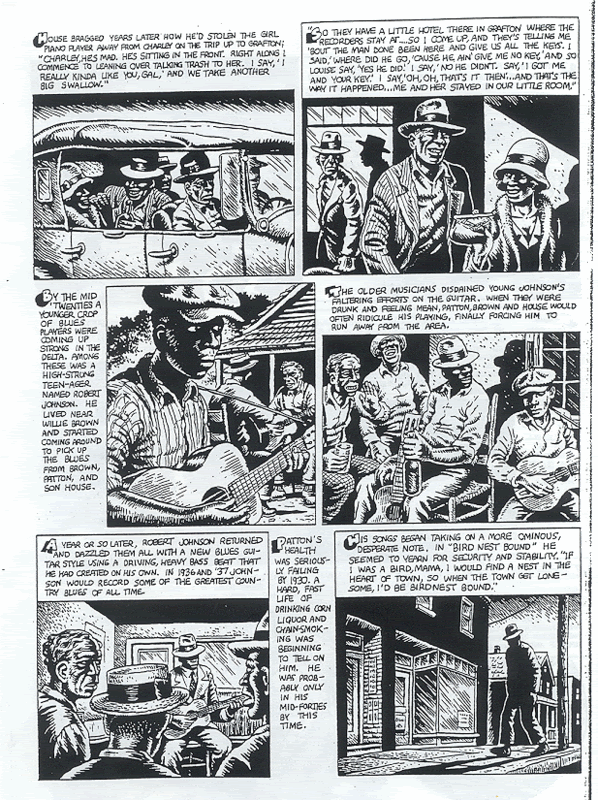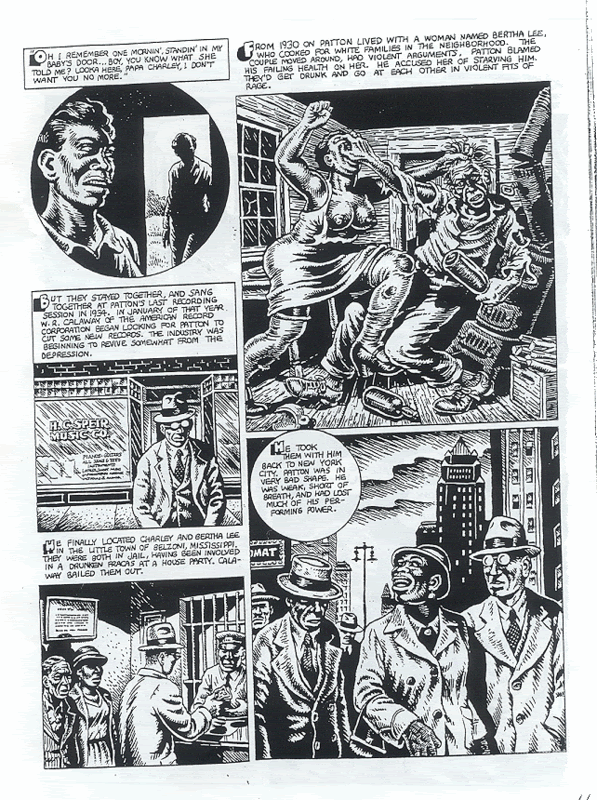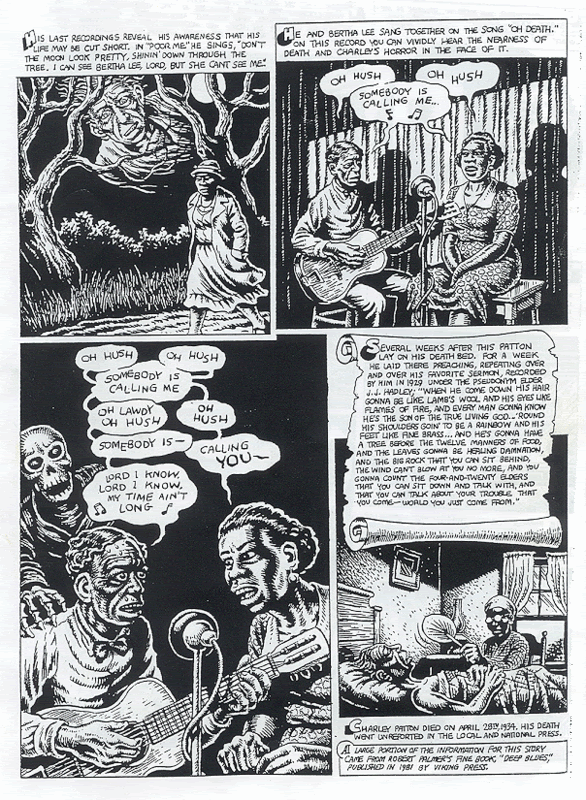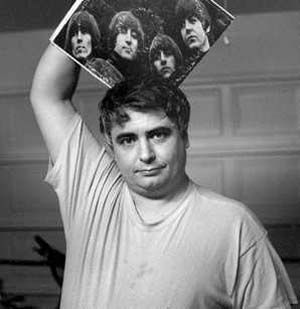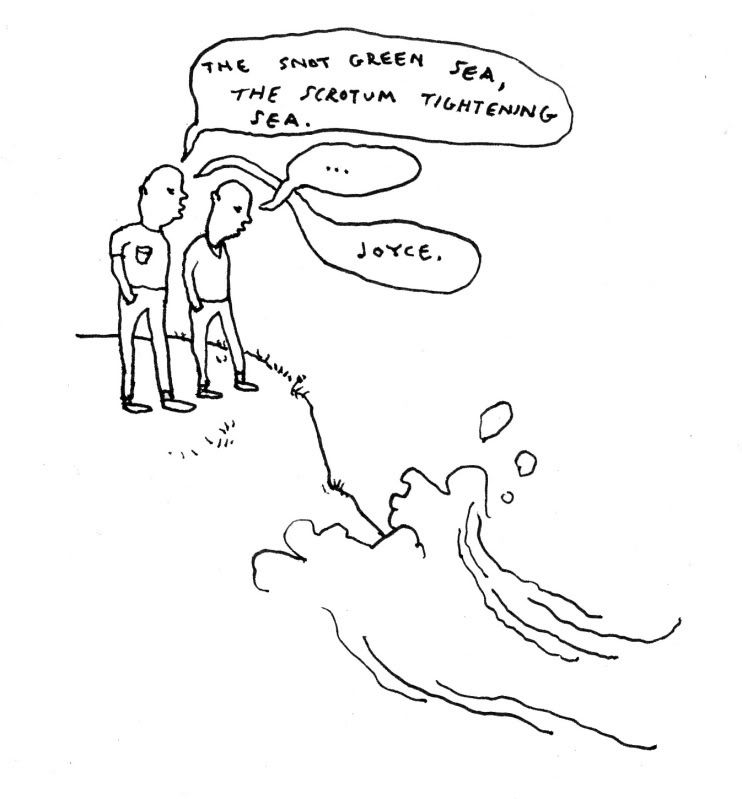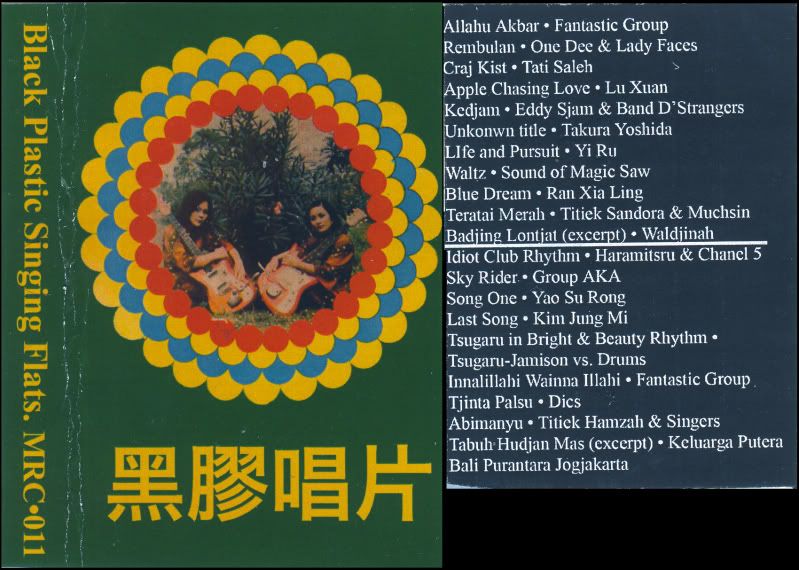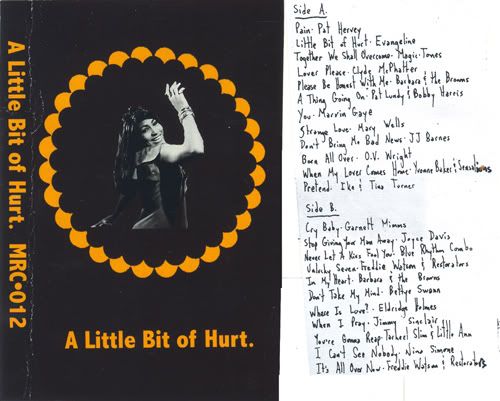4.30.2009
I'M A GONER TOO: PUNKS ON TV
Quincy, M.E.'s infamous "punk episode" featuring Mayhem. The show's writers apparently thought of punk as nothing more than a dark riff on hippie subculture, and made sure to give the characters as manny drawn-out "yeah, mans" as possible. Quincy punks indeed.
Pain, "all the way from the hills of Hollyweird," on CHiPs.
"I Hate You," as performed by Edge of Etiquette, a one-off band made up of Voyage Home producer Kirk Thatcher and some assorted crew members.
A real punk on TV: NOLA/Memphis/Portland legend King Louie Bankston live on a Memphis station's morning show.
4.29.2009
SOUL POWER
A new documentary chronicling Don King's effort to hype the Rumble in the Jungle with an all-star music revue in Zaire. The film looks to feature some pretty great performances from the Spinners, James Brown, Miriam Makeba, among others.
4.28.2009
IMPOSSIBLE SHAPES
Italian police riding in formation ca. the 1960s; it's like a larger-scale version of "Il Geghegé," that Rita Pavone video we posted a while back.
(thanks Elspeth!)
4.27.2009
HE'S THE DUKE, SHE'S THE DUCHESS
Bo Diddley with Norma-Jean Wofford:
Now without Norma-Jean; this is possibly (probably?) the wildest footage of Bo ever put to tape:
Now without Norma-Jean; this is possibly (probably?) the wildest footage of Bo ever put to tape:
4.25.2009
4.24.2009
MISSISSIPPI RECORDS: TRUE STORY OF ABNER JAY
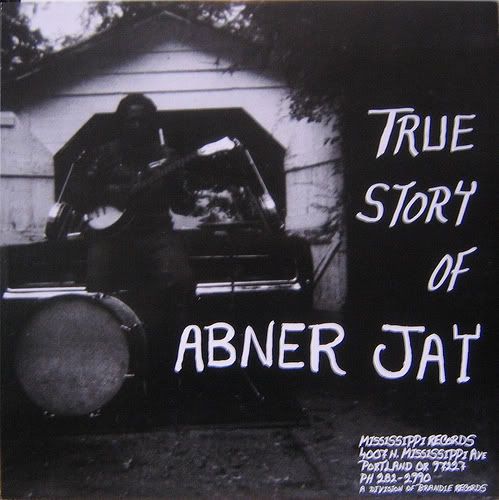
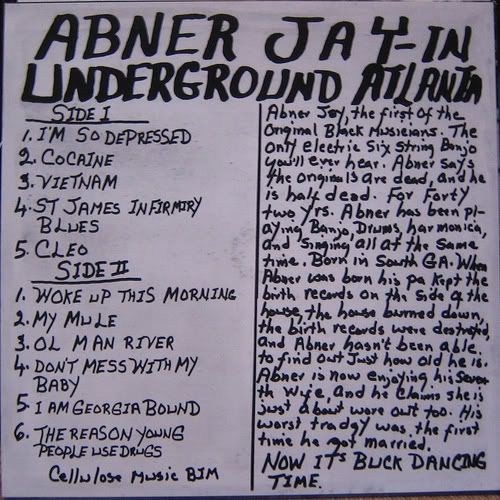
Another great release from our friends at Mississippi, True Story of Abner Jay eschews the singer's famous pre-song rants, instead allowing the legendary Atlanta area one-man-band's compositions to stand on their own.
4.23.2009
ELLA FITZGERALD: LIVE AT MR. KELLY'S




Taken by Yale Joel in 1958, these photographs show Lady Ella performing at the intimate Chicago institution Mr. Kelley's.
4.22.2009
4.21.2009
4.20.2009
THE FEELINGS: ESPECIALLY FOR YOU

One of the great unsung Portland bands of the mid/late 90's, the Feelings' brand of lo-fi keys-and-guitar mayhem holds a special place in our hearts. The band managed to spit out two and a half albums, the one featured here followed by Dearling Darling. The final Feelings release was a bizarre, posthumously issued "rarities and remixes" EP called Jammers. We featured a track of theirs on a Big States mix a while back; here's the whole deal.
4.17.2009
ON MAXWELL STREET: CARRIE ROBINSON
Maxwell Street is the name of Chicago's long-running weekend flea market that's not actually on Maxwell Street anymore. Notable not only for it's robustness, Maxwell Street Market is credited with being a key part in the development of the Chicago Blues, as musicians who played there in the 30s and 40s began to amplify their instruments in order to be heard over the din of shoppers and hustlers. Despite being responsible for the worst development in the evolution of recorded harmonica, the Maxwell Street blues scene inspired countless amateurs to greatness; this clip features Carrie Robinson employing an amp to spread the Gospel, ca. 1964
Taken from the film And This is Free: The Life and Times of Chicago's Legendary Maxwell St.
(Thanks Gina!)
Taken from the film And This is Free: The Life and Times of Chicago's Legendary Maxwell St.
(Thanks Gina!)
4.16.2009
PORTLAND TRAILBLAZERS: RISE UP
Hot on the heels of my "sports post" (in which I declare Portland basketball the only sport that turns me on) the Blazers clinched a spot in the NBA playoffs. This will be the teams first chance at the post-season since 2003, the year that marked an end to Portland's unprecedented streak of 21 straight playoff appearances.
There were 14 games played in the NBA on Wednesday, and after a series of missed free-throws (New Orleans) and wild buzzer-beaters (San Antonio), the Blazers emerged with a win over the Denver Nuggets and the coveted 4th-place seeding, which translates to home-court advantage and a first round match-up against the Houston Rockets. As the franchise is wont to do during high times and fair weather, they have released yet another Blazers rap video.
There were 14 games played in the NBA on Wednesday, and after a series of missed free-throws (New Orleans) and wild buzzer-beaters (San Antonio), the Blazers emerged with a win over the Denver Nuggets and the coveted 4th-place seeding, which translates to home-court advantage and a first round match-up against the Houston Rockets. As the franchise is wont to do during high times and fair weather, they have released yet another Blazers rap video.
4.15.2009
POSITIVE MENTAL ATTITUDE
A deep and varied catalog of hardcore ephemera, The Hardcore Archaeologist offers an interesting view into the aesthetics of the underground. Presented without commentary, Jeremy's photos of record sleeves, show fliers, and other assorted punk detritus invite the viewer to investigate the images in an environment free of the usual fawning fan-boys and posturing intellectuals. It's a refreshing bit (mostly) Rollins-free punk history.
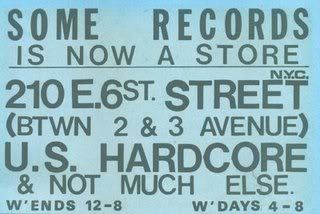
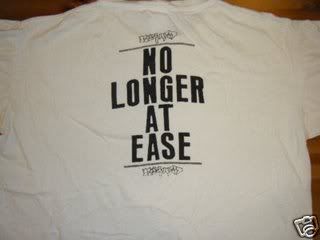

via Selectism



via Selectism
4.14.2009
POP POLEMIC: IAN SVENONIUS AND THE SOUND OF DISSENT
I've been reading a lot of Thomas Frank lately. In his essays Why Johnny Can’t Dissent, Alternative to What? and Twenty-Nothing (with Keith White) Frank, once head Baffler and current l’enfant terrible of the new left, outlines and catalogs the myriad ways in which the hegemonic forces of an increasingly corporate, capitalist, and consumerist American culture have fashioned notions of rebellion into salable commodities. Holding up as evidence the clever advertising strategies developed by “Mad Men” in the 50s and 60s, Frank dismisses and attempts to discredit notions of individuality and defiance as they are understood by society today (punk rock, apathy, Beat poetry, etc.), insisting that the Three C’s enumerated above have been wholly successful at co-opting all but the most lunatic fringe.
Noticing a startling and “complete lack of dissonance between” corporate America and the “countercultural idea,” Frank rails against this “Apollonian” ideology and proclaims that he and his cohort—true dissidents—are “too cynical too young about [its] motives, [its] politics, [its] TV, [its] bad rock’n’roll” for the “mechanical yammering” of the new square America to get him down. Citing independent music as a kind of revolutionary gateway drug and confident that there are “a hundred local scenes alive with enthusiasm and camaraderie and the promise of asylum,” Frank assures the so-called “Culture Trust” that “our generational compass was recalibrated instantly with a glimpse into the working of the machine: We were now outside, our tastes and thoughts automatically condemned by a smug alliance of hippies and business men.” He must have more than a few Ian Svenonius records in his collection.
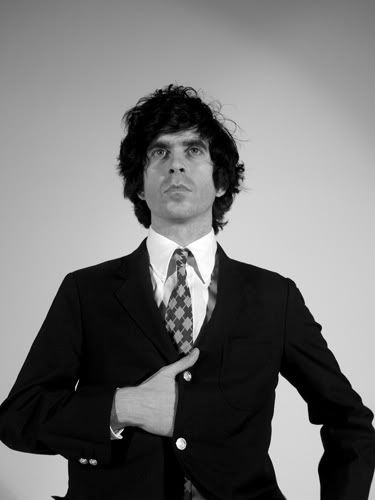
Taking a similar if less dour tract than Frank, Svenonius, front man for the defunct DC post-punk band Nation of Ulysses (NOU), has—in more than two decades of grinding it out in the punk rock underground—deftly and relentlessly skewered both Frank’s ominous “Culture Trust” and the oft-feverish philippic of neo-Marxist radicals. Nation of Ulysses’ first record—the frenetic, frantic, kinetic 13-Point Program to Destroy America—borrows not only its title (a reference to the Black Panther’s infamous “Ten-Point Program”) from leftist rhetoric, but its entire aesthetic to boot. Mimicking the “samizdat tradition” aesthetically if not practically (regardless of its “underground” nature, there’s nothing clandestine about putting out records), the liner notes to 13-Point Plan… read like a bubblegum version of The Communist Manifesto.
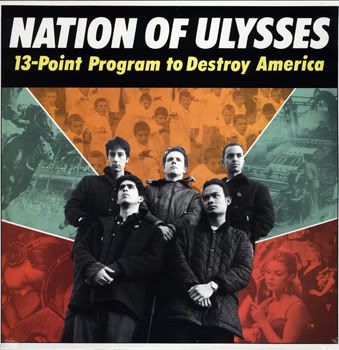
NOU insisted the release wasn’t a record at all but in fact a weapon that must be used to “reveal… [the] abhorred parent culture” and assist in the “violent destruction of the new urban bourgeouise (sic).” A self-described musical Jihad, NOU urges the “true kids” to “wreck society through direct action” and “off the pigs in all their forms.” Sleep is viewed as a “death-like state… which must be obliterated” through massive candy consumption, while adults are merely “those who obscure their folly through a postured roll in the dungheap of yesteryear.” Svenonius and Co. went so far as to include in the liner notes a pictorial guide to removing one’s fingerprints so as to stymie the powers that be.
Simultaneously drawing from pop-culture camp and dense political and social theory, Svenonius has constructed an elaborate mythos at once serious and playful. In “A Kid Who Tells on Another Kid is a Dead Kid,” NOU appropriate the central imagery of the 1979 b-movie Over The Edge, fashioning the film’s goofy take on suburban teenage delinquents into a panicked missive on the necessity of actual violent teen rebellion, one in which the cool kids rule and square kids drool.
A Kid Who Tells On Another Kid is a Dead Kid
Likewise, in “Spectra Sonic Sound” NOU expertly synthesize the affected monster-worship of certain 70s punk bands (Misfits, Cramps, etc.) and the giddy, kiddie love of candy with revolutionary rhetoric, asserting, “Halloween is a potent instrument for revolt, with its tradition of massing and masking the dispossessed.” The lyrics read, in part:
It reads like a pro-Union number out of the Wobbly’s Little Red Songbook.
Spectra Sonic Sound
Further evidence of Svenonius’ playful hacking at both the establishment and the underground is found in “Look Out! Soul Is Back,” both a good-time party anthem and NOU’s attempt to wrest music out of corporate hands. Svenonius—like Frank—views “punk as a tool of the ruling class and rock’n’roll a secret tool of capitalism” and has declared that ''since rock was, in subterfuge, capitalism's secret exponent, in victory it no longer has a mission.'' That NOU worked firmly in the post-punk and no-wave idioms is apparently unimportant: “soul music” for NOU means that which hasn’t yet been co-opted by the mainstream “enemy,” the idea being popular music in any genre is of course “inherently soulless.”
Look Out! Soul is Back!
When NOU split in 1992, Svenonius formed a new band called Make-Up to keep up the rallying cry of teen revolt. Allying themselves philosophically with Guy Debord’s Situationist International, the members of Make-Up declared themselves “card-carrying ideologists” and refused to delineate between art and politics. Less explicitly didactic, Make-Up’s songs were essentially devoid of the fiery lyrical rhetoric that marked those by NOU. Instead, Svenonius chose to focus on the more formal aspects of his musical revolution: in keeping with NOU’s proclamation that they would “dress well, as clothing and fashion are the only things which… the kids… have any control over,” the members of Make-Up often wore highly stylized matching stage costumes, evoking a cartoonishly square 60s aesthetic.
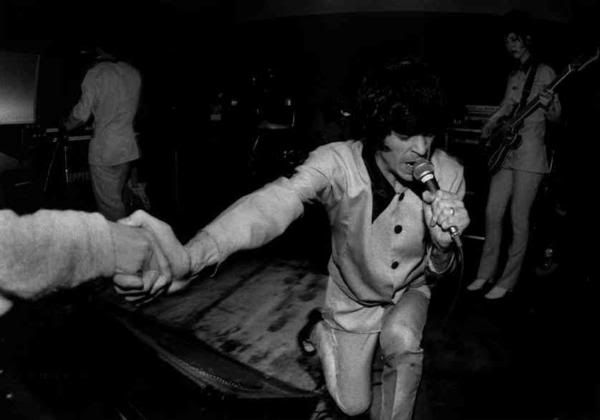
Additionally, the group endeavored to appropriate some formal aspects of Gospel music, namely its use of the congregation as a “fifth member.” Make-Up fused this notion of audience participation (call and response, “physical transgression,” etc.) to Marxist ideas of an expanded socialist workforce. Citing the “factory style” production of French yé-yé music in combination with their attempts to establish the audience as participants, they viewed Make-Up as a means to combat what they saw as a “trend (begun by the Beatles) toward self-sufficiency” and “downsizing labor” in rock’n’roll. They termed their new sound “Gospel Yeh-Yeh” and Svenonius described it thusly:
And when asked if, in accordance with the NOU’s original ideology he still wanted to destroy America, Svenonius answered simply, “Of course.”
The Make-Up's "formal ideology" is clearly on display in this live performance.
Make-Up disbanded in 1999, and Svenonius’ bands since have been less and less overtly political (though his upcoming record Down With Liberty... Up With Chains, recorded with his new band Chain and The Gang, may reverse this trend), Svenonius himself has continued his satirical and often self-contradictory assault on the underground. In The Psychic Soviet, a book of his essays published in 2006, Svenonius argues that while “Christianity was primarily a tool of the ruling class to convince their impoverished servants to defer pleasure and human rights until a miraculous ‘afterlife,’ rock’n’roll is a capitalist cult” which relies on and “worships the tenets of the market economy: consumerism, newness, and planned obsolescence.” He further suggests that the protagonist in the Rolling Stones’ “Sympathy For the Devil” isn’t Lucifer at all, but “the Marxist idea of dialecticism through history, the inevitable changes that lead us from exploitation… to a Socialist government and Communist society: a process called ‘historical materialism.’” A bit like that titular devil himself, Svenonius continues to evolve his elaborate doctrines.

While satire is hardly a new device, its use as a tool of social criticism is often overlooked and taken less than seriously; outside of television shows like The Simpsons or The Daily Show, most “twenty-nothings” these days see very little in the way of intellectual social parody. With NOU and Make-Up, with his various essays and his current gig as host of Soft Focus, Ian Svenonius has created a lasting, legitimate body of social satire, and has proven once and for all that Johnny can, and must, dissent.
Noticing a startling and “complete lack of dissonance between” corporate America and the “countercultural idea,” Frank rails against this “Apollonian” ideology and proclaims that he and his cohort—true dissidents—are “too cynical too young about [its] motives, [its] politics, [its] TV, [its] bad rock’n’roll” for the “mechanical yammering” of the new square America to get him down. Citing independent music as a kind of revolutionary gateway drug and confident that there are “a hundred local scenes alive with enthusiasm and camaraderie and the promise of asylum,” Frank assures the so-called “Culture Trust” that “our generational compass was recalibrated instantly with a glimpse into the working of the machine: We were now outside, our tastes and thoughts automatically condemned by a smug alliance of hippies and business men.” He must have more than a few Ian Svenonius records in his collection.

Taking a similar if less dour tract than Frank, Svenonius, front man for the defunct DC post-punk band Nation of Ulysses (NOU), has—in more than two decades of grinding it out in the punk rock underground—deftly and relentlessly skewered both Frank’s ominous “Culture Trust” and the oft-feverish philippic of neo-Marxist radicals. Nation of Ulysses’ first record—the frenetic, frantic, kinetic 13-Point Program to Destroy America—borrows not only its title (a reference to the Black Panther’s infamous “Ten-Point Program”) from leftist rhetoric, but its entire aesthetic to boot. Mimicking the “samizdat tradition” aesthetically if not practically (regardless of its “underground” nature, there’s nothing clandestine about putting out records), the liner notes to 13-Point Plan… read like a bubblegum version of The Communist Manifesto.

NOU insisted the release wasn’t a record at all but in fact a weapon that must be used to “reveal… [the] abhorred parent culture” and assist in the “violent destruction of the new urban bourgeouise (sic).” A self-described musical Jihad, NOU urges the “true kids” to “wreck society through direct action” and “off the pigs in all their forms.” Sleep is viewed as a “death-like state… which must be obliterated” through massive candy consumption, while adults are merely “those who obscure their folly through a postured roll in the dungheap of yesteryear.” Svenonius and Co. went so far as to include in the liner notes a pictorial guide to removing one’s fingerprints so as to stymie the powers that be.
Simultaneously drawing from pop-culture camp and dense political and social theory, Svenonius has constructed an elaborate mythos at once serious and playful. In “A Kid Who Tells on Another Kid is a Dead Kid,” NOU appropriate the central imagery of the 1979 b-movie Over The Edge, fashioning the film’s goofy take on suburban teenage delinquents into a panicked missive on the necessity of actual violent teen rebellion, one in which the cool kids rule and square kids drool.
A Kid Who Tells On Another Kid is a Dead Kid
Likewise, in “Spectra Sonic Sound” NOU expertly synthesize the affected monster-worship of certain 70s punk bands (Misfits, Cramps, etc.) and the giddy, kiddie love of candy with revolutionary rhetoric, asserting, “Halloween is a potent instrument for revolt, with its tradition of massing and masking the dispossessed.” The lyrics read, in part:
When they raise their voice, they haven’t a choice
But to give it to them in their outstretched hands
Or watch their property go up in flames
It reads like a pro-Union number out of the Wobbly’s Little Red Songbook.
Spectra Sonic Sound
Further evidence of Svenonius’ playful hacking at both the establishment and the underground is found in “Look Out! Soul Is Back,” both a good-time party anthem and NOU’s attempt to wrest music out of corporate hands. Svenonius—like Frank—views “punk as a tool of the ruling class and rock’n’roll a secret tool of capitalism” and has declared that ''since rock was, in subterfuge, capitalism's secret exponent, in victory it no longer has a mission.'' That NOU worked firmly in the post-punk and no-wave idioms is apparently unimportant: “soul music” for NOU means that which hasn’t yet been co-opted by the mainstream “enemy,” the idea being popular music in any genre is of course “inherently soulless.”
Look Out! Soul is Back!
When NOU split in 1992, Svenonius formed a new band called Make-Up to keep up the rallying cry of teen revolt. Allying themselves philosophically with Guy Debord’s Situationist International, the members of Make-Up declared themselves “card-carrying ideologists” and refused to delineate between art and politics. Less explicitly didactic, Make-Up’s songs were essentially devoid of the fiery lyrical rhetoric that marked those by NOU. Instead, Svenonius chose to focus on the more formal aspects of his musical revolution: in keeping with NOU’s proclamation that they would “dress well, as clothing and fashion are the only things which… the kids… have any control over,” the members of Make-Up often wore highly stylized matching stage costumes, evoking a cartoonishly square 60s aesthetic.

Additionally, the group endeavored to appropriate some formal aspects of Gospel music, namely its use of the congregation as a “fifth member.” Make-Up fused this notion of audience participation (call and response, “physical transgression,” etc.) to Marxist ideas of an expanded socialist workforce. Citing the “factory style” production of French yé-yé music in combination with their attempts to establish the audience as participants, they viewed Make-Up as a means to combat what they saw as a “trend (begun by the Beatles) toward self-sufficiency” and “downsizing labor” in rock’n’roll. They termed their new sound “Gospel Yeh-Yeh” and Svenonius described it thusly:
So now, they're going one step further, and that's the DJ culture that's taking over. Electronica is taking over because A: all the rock n' roll is so boring. But also B: because...its just the nature of capitalism. The cheapest thing will prevail. That's why corporations that use Mexican slave labor will always prevail over corporations that use union labor.
My point is: that Gospel Yeh-Yeh utilizes the entire congregation. So it’s kind of going in the inverse of the modern trend toward [utilizing] one person.
And when asked if, in accordance with the NOU’s original ideology he still wanted to destroy America, Svenonius answered simply, “Of course.”
The Make-Up's "formal ideology" is clearly on display in this live performance.
Make-Up disbanded in 1999, and Svenonius’ bands since have been less and less overtly political (though his upcoming record Down With Liberty... Up With Chains, recorded with his new band Chain and The Gang, may reverse this trend), Svenonius himself has continued his satirical and often self-contradictory assault on the underground. In The Psychic Soviet, a book of his essays published in 2006, Svenonius argues that while “Christianity was primarily a tool of the ruling class to convince their impoverished servants to defer pleasure and human rights until a miraculous ‘afterlife,’ rock’n’roll is a capitalist cult” which relies on and “worships the tenets of the market economy: consumerism, newness, and planned obsolescence.” He further suggests that the protagonist in the Rolling Stones’ “Sympathy For the Devil” isn’t Lucifer at all, but “the Marxist idea of dialecticism through history, the inevitable changes that lead us from exploitation… to a Socialist government and Communist society: a process called ‘historical materialism.’” A bit like that titular devil himself, Svenonius continues to evolve his elaborate doctrines.

While satire is hardly a new device, its use as a tool of social criticism is often overlooked and taken less than seriously; outside of television shows like The Simpsons or The Daily Show, most “twenty-nothings” these days see very little in the way of intellectual social parody. With NOU and Make-Up, with his various essays and his current gig as host of Soft Focus, Ian Svenonius has created a lasting, legitimate body of social satire, and has proven once and for all that Johnny can, and must, dissent.
4.13.2009
4.11.2009
ALL STAR JAM
(via eye rocket)
I wonder if James Brown felt a kind of Jesse Jackson style irritation at being eclipsed by a new type of soul singer. Prince and Michael Jackson both worked from the platform he worked to create. And here he is, left marooned on the stage shouting for Prince to come burn it down. Brown goes on smiling while Prince slow pumps his guitar, disrobes, then knocks down the set lighting.
This is a man who built his career on refusing to ever be upstaged.
"James just had to be last, and finally we put him last before the intermission, second best spot, and he jumped off the balcony to cap his act, figuring that would really kill them. Damn near killed himself. That's when I first knew him as an egomaniac--and we're friends to this day!" - Zenas Sears recalls playing with Brown in the late fifties. From Sweet Soul Music.
It's pretty thrilling to hear Michael sing some straight soul music. And the moonwalk! YES! Like watching a young Pacino-- nice to be reminded just why anyone began caring in the first place.
4.10.2009
THE WIPERS: OVER THE EDGE
Portland's legendary Wipers live in 1983.
From the documentary Northwest Passage: The Birth of Portland's DIY Culture.
From the documentary Northwest Passage: The Birth of Portland's DIY Culture.
4.09.2009
WHITE STAG/MADE IN OREGON: UPDATE
We wrote about the dust-up created by proposed changes to Portland's iconic "White Stag" a while ago. It appears the powers that be have reached a decision regarding the Rose City's beloved landmark. This digital rendering, devoid of any patina or romance, is probably a smart choice; it's not explicitly advertising anything but our fair state, unlike any of the sign's previous incarnations.
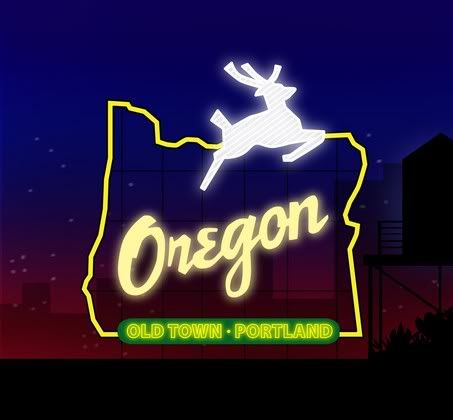

4.08.2009
4.07.2009
JENNIFER ANGUS: INSECTA FANTASIA
Insecta Fantasia, up now at the Newark Museum, is the work of entomologist and textile designer Jennifer Angus. Angus creates startling and intriguing insect "wallpaper" by pinning thousands of dead and dried insects to the walls in intricate and dizzying patterns. The video below, with its goofy fawning and hushed tones, is reminiscent of SNL's "Delicious Dish" NPR parodies, but the work itself is pretty great.
via Selectism
via Selectism
4.06.2009
4.03.2009
IRON MIKE IS IN THE HOUSE: ON BOXING
The new trailer for James Toback's documentary Tyson has me thinking about sports lately.
I've never been the biggest sports guy. Growing up, Portland only had one professional sports franchise - our beloved Trailblazers - but none of my parents were ever particularly interested, and despite the infamous "Rip City Rhapsody," the team wasn't stitched into the fabric of everyday city life like I imagine it must be in Green Bay. I played soccer and skied a bit as a kid, but in high school I began to posit an identity based in opposition to the "normal" kids.
Searching in vain for visual signifiers that might set me apart, my closet filled up with outré clothing and my attitude evolved into one of righteous entitlement and intellectual superiority. I began - aggressively, firmly and wholly - to occupy space typically reserved for fuck-ups, burn-outs and misfits. I hung out in that corner of my high school campus that belonged to the goth kids and weed dealers and taggers, if only to separate myself from the straight-laced squares who dominated school life. We talked about music and drugs, philosophy and art, and our 14 year old steel-trap minds reeled at the myriad possible meanings of "Smells Like Teen Spirit."
Sports weren't a part of this world, and in fact served as a general totem of derision. Jocks were idiots, nothing more than brain-dead sheep destined to become regional managers or accountants, the paradigm of safe and boring. And while I dismissed team sports outright, some bit of me nagged and longed for the spirit of competition engendered by them. Turning to my heroes for inspiration, I realized I had a few options that would allow me to both indulge my need for sportsmanship and still maintain an air of detached and writerly cool. But it turns out I could never fully give in to the calculated romance of Bukowski's ponies, I'm generally put off by the sight of shivering greyhounds, and was (and remain) without the means to fly to Spain to catch the bullfights with any regularity.
When I was fifteen or so, and making the long commute from NE Portland to Beaverton for high school, I would often stop off downtown in the afternoon, mostly to get coffee or go to the record store. It was during one of these after-school dalliances that I first discovered PDXS, a biweekly alternative rag that- along with the also now-defunct Rocket- began to serve as my guide to the local underground.
In addition to being my introduction to Dan Savage, PDXS also piqued my interest in boxing. When We Were Kings had come out around this time, and it seemed that boxing had a history of producing interesting and charismatic characters: the magnetism of Muhammad Ali was undeniable. And the notion of boxing as something that transcended mere sport had entered my mind before, mainly due the endless artistic expressions of the sport (there is boxing in the Iliad after all, not to mention the Miles Davis record A Tribute to Jack Johnson, etc.)
Anyway, Katherine Dunn, who wrote the grotesque, touching Geek Love- a book that had a profound influence on my literary aesthetic when I read it as a 15 year old- contributed a weekly boxing column to the paper. I read it regularly, fascinated by her high-literary musings on the brute force of men who regularly don silk shorts as part of their job description. In early July, 1997, Dunn authored an essay defending Mike Tyson's infamous ear-biting in his match against Evander Holyfield.
Dunn's deft intellectual refutation of the prevailing "Tyson is a monster" party line further calcified my increasing suspicion that boxing was the sport for me. Couched not in the rhetoric of sports hyperbole but in the analytic (if occasionally sarcastic) tones of academia, Dunn's piece adroitly exposed the latent racism fueling the uproar over Tyson's alleged transgression. It read in part:
The way Dunn wrote about boxing had me convinced that the sport was indeed a kind of high art, worthy of serious critical and intellectual engagement. For her, boxing was as much about cultural analysis as it was about two men beating the crap out of each other. And it made sense to me; boxing's history was not only romantically ancient, but inexorably enmeshed with the US's realpolitik of 20th century race- and classism.
Make no mistake, the crowd is not cheering for Johnson when he knocks Jefferies to the ground: they're chanting "Kill the nigger!"
But try as I might, no amount of intellectual compartmentalizing could keep me interested in the sport: the whole thing seemed so burdened. And while I get that some find an athletic purity in the idea of two technicians wailing away at each other, the subtle differences between in- and out-fighting, jabs and hooks, or the occasional employment of a bolo-punch keeping the mind stimulated and the bloodthirst whetted, the whole endeavor makes me squirm a little. As articulate as Ali once was, there's no denying that decades in the ring have destroyed his mental faculty. There's nothing terribly romantic or erudite about losing one's mind to Parkinson's.
As I've grown older, I've allowed the appeal of sports to exist untethered to notions of literary romance; I'm no longer concerned that my interest in the Trailblazers (or, for that matter, my disinterest in European "football") will brand me a philistine. I'm content to watch the game, preferably over beers at Daddy Mojo's, and I'm comfortable knowing that I'll never really care about boxing, no matter how compellingly Katherine Dunn writes about it. Besides, I was never that great at sports anyway, and generally fared about as well as Little Mac in the clip below.
Dunn's new book One Ring Circus: Dispatches from the World of Boxing, which includes the Tyson essay in its entirety, will be out in May.
I've never been the biggest sports guy. Growing up, Portland only had one professional sports franchise - our beloved Trailblazers - but none of my parents were ever particularly interested, and despite the infamous "Rip City Rhapsody," the team wasn't stitched into the fabric of everyday city life like I imagine it must be in Green Bay. I played soccer and skied a bit as a kid, but in high school I began to posit an identity based in opposition to the "normal" kids.
Searching in vain for visual signifiers that might set me apart, my closet filled up with outré clothing and my attitude evolved into one of righteous entitlement and intellectual superiority. I began - aggressively, firmly and wholly - to occupy space typically reserved for fuck-ups, burn-outs and misfits. I hung out in that corner of my high school campus that belonged to the goth kids and weed dealers and taggers, if only to separate myself from the straight-laced squares who dominated school life. We talked about music and drugs, philosophy and art, and our 14 year old steel-trap minds reeled at the myriad possible meanings of "Smells Like Teen Spirit."
Sports weren't a part of this world, and in fact served as a general totem of derision. Jocks were idiots, nothing more than brain-dead sheep destined to become regional managers or accountants, the paradigm of safe and boring. And while I dismissed team sports outright, some bit of me nagged and longed for the spirit of competition engendered by them. Turning to my heroes for inspiration, I realized I had a few options that would allow me to both indulge my need for sportsmanship and still maintain an air of detached and writerly cool. But it turns out I could never fully give in to the calculated romance of Bukowski's ponies, I'm generally put off by the sight of shivering greyhounds, and was (and remain) without the means to fly to Spain to catch the bullfights with any regularity.
When I was fifteen or so, and making the long commute from NE Portland to Beaverton for high school, I would often stop off downtown in the afternoon, mostly to get coffee or go to the record store. It was during one of these after-school dalliances that I first discovered PDXS, a biweekly alternative rag that- along with the also now-defunct Rocket- began to serve as my guide to the local underground.
In addition to being my introduction to Dan Savage, PDXS also piqued my interest in boxing. When We Were Kings had come out around this time, and it seemed that boxing had a history of producing interesting and charismatic characters: the magnetism of Muhammad Ali was undeniable. And the notion of boxing as something that transcended mere sport had entered my mind before, mainly due the endless artistic expressions of the sport (there is boxing in the Iliad after all, not to mention the Miles Davis record A Tribute to Jack Johnson, etc.)
Anyway, Katherine Dunn, who wrote the grotesque, touching Geek Love- a book that had a profound influence on my literary aesthetic when I read it as a 15 year old- contributed a weekly boxing column to the paper. I read it regularly, fascinated by her high-literary musings on the brute force of men who regularly don silk shorts as part of their job description. In early July, 1997, Dunn authored an essay defending Mike Tyson's infamous ear-biting in his match against Evander Holyfield.
Dunn's deft intellectual refutation of the prevailing "Tyson is a monster" party line further calcified my increasing suspicion that boxing was the sport for me. Couched not in the rhetoric of sports hyperbole but in the analytic (if occasionally sarcastic) tones of academia, Dunn's piece adroitly exposed the latent racism fueling the uproar over Tyson's alleged transgression. It read in part:
"...the verdict has already been shrieked from the headlines and TV sets of America. TYSON BAD! The cover of Sports Illustrated magazine blasts "MADMAN !" in huge type. The tag is "A crazed Mike Tyson disgraces himself and his sport." Columnist Dave Anderson of the New York Times describes Tyson as a "mad pit bull." The adjectives are flying thick and nasty--"dirty, disgusting, repellant, bestial, loathsome, vile, animalistic, vampiristic, deranged, maniacal, cannibalistic, murderous, cowardly..." Bill Clinton was horrified. John Sununu and Geraldine Ferraro held a Crossfire debate on "Tyson Bite" which degenerated into a "Ban Boxing" rally. The press could scarcely be more enflamed if the guy had reached up Holyfield's rectum and ripped out his heart in front of the TV cameras. The conviction of Tim McVeigh didn't trigger this kind of venom. In fact, we haven't seen this much hysteria since the first O.J. verdict. "Bad" black men drive the press batty..."
The way Dunn wrote about boxing had me convinced that the sport was indeed a kind of high art, worthy of serious critical and intellectual engagement. For her, boxing was as much about cultural analysis as it was about two men beating the crap out of each other. And it made sense to me; boxing's history was not only romantically ancient, but inexorably enmeshed with the US's realpolitik of 20th century race- and classism.
Make no mistake, the crowd is not cheering for Johnson when he knocks Jefferies to the ground: they're chanting "Kill the nigger!"
But try as I might, no amount of intellectual compartmentalizing could keep me interested in the sport: the whole thing seemed so burdened. And while I get that some find an athletic purity in the idea of two technicians wailing away at each other, the subtle differences between in- and out-fighting, jabs and hooks, or the occasional employment of a bolo-punch keeping the mind stimulated and the bloodthirst whetted, the whole endeavor makes me squirm a little. As articulate as Ali once was, there's no denying that decades in the ring have destroyed his mental faculty. There's nothing terribly romantic or erudite about losing one's mind to Parkinson's.
As I've grown older, I've allowed the appeal of sports to exist untethered to notions of literary romance; I'm no longer concerned that my interest in the Trailblazers (or, for that matter, my disinterest in European "football") will brand me a philistine. I'm content to watch the game, preferably over beers at Daddy Mojo's, and I'm comfortable knowing that I'll never really care about boxing, no matter how compellingly Katherine Dunn writes about it. Besides, I was never that great at sports anyway, and generally fared about as well as Little Mac in the clip below.
Dunn's new book One Ring Circus: Dispatches from the World of Boxing, which includes the Tyson essay in its entirety, will be out in May.
4.01.2009
THESE ARE THE DRUMS
The Art Farmer Quartet perform "My Little Suede Shoes."
At 4:30 Walter Perkins smiles. Blowing minds and warming hearts.
Subscribe to:
Comments (Atom)
ARCHIVE
-
▼
2009
(185)
-
▼
April
(27)
- I'M A GONER TOO: PUNKS ON TV
- SOUL POWER
- IMPOSSIBLE SHAPES
- HE'S THE DUKE, SHE'S THE DUCHESS
- R. CRUMB ON CHARLEY PATTON
- MISSISSIPPI RECORDS: TRUE STORY OF ABNER JAY
- THEY REALLY WERE VERY GOOD
- No title
- ELLA FITZGERALD: LIVE AT MR. KELLY'S
- GAIL + DALE: A MODERN SPIRITUAL
- IN THE SUMMERTIME
- THE FEELINGS: ESPECIALLY FOR YOU
- ON MAXWELL STREET: CARRIE ROBINSON
- PORTLAND TRAILBLAZERS: RISE UP
- POSITIVE MENTAL ATTITUDE
- POP POLEMIC: IAN SVENONIUS AND THE SOUND OF DISSENT
- DO IT YOURSELF
- ALL STAR JAM
- THE WIPERS: OVER THE EDGE
- WHITE STAG/MADE IN OREGON: UPDATE
- GO GO RITA PAVONE
- JENNIFER ANGUS: INSECTA FANTASIA
- SMOKIN' SMARTIES
- IRON MIKE IS IN THE HOUSE: ON BOXING
- MISSISSIPPI RECORDS: CASSETTE SERIES VOL. 11 & 12
- THESE ARE THE DRUMS
- COMMODIFY YOUR DISSENT
-
▼
April
(27)
LINKS
CATEGORIES
- art (13)
- chicago soul (4)
- comics (5)
- interviews (2)
- long stuff (2)
- mississippi records (14)
- mixes (8)
- photography (10)
- reviews (5)
